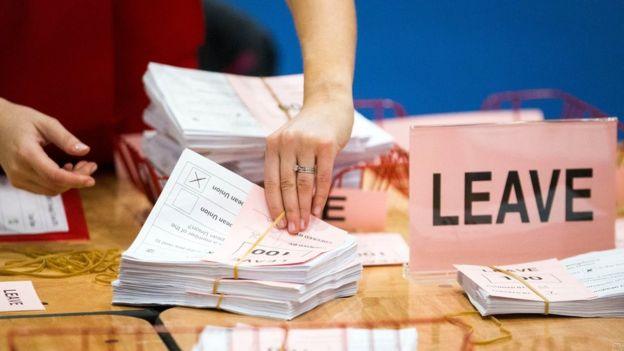Badenoch mistakenly says NI voted in favour of Brexit
"The last time I checked, Northern Ireland did vote to leave."
- Published
Conservative leader Kemi Badenoch has mistakenly said Northern Ireland "voted to leave" the European Union as she defended her party's record on Brexit.
In an interview with BBC News NI, she said: "The last time I checked, Northern Ireland did vote to leave."
Northern Ireland voted by 56% to 44% in favour of staying in the EU in the 2016 referendum, which saw the UK overall vote to leave by a majority of 52% to 48%.
When pressed, Badenoch later corrected herself, saying: "Scotland voted to remain, a lot of people in Northern Ireland voted to remain, you're right - but Wales and England voted to leave, the UK as a whole voted to leave."
'The best of both worlds'
Badenoch was speaking ahead of her party's annual conference this weekend.
She has been the Tory leader for almost 12 months after her party lost the 2024 general election to Labour.
Asked how her party was good for the union, after it had delivered the controversial post-Brexit Irish Sea border, which left Northern Ireland under different trading arrangements than Great Britain, Badenoch replied: "Last time I checked Northern Ireland voted to leave (the EU)."
When told that Northern Ireland voted to remain in the EU, she replied: "I do recognise the people of Northern Ireland voted to remain and we came up with a settlement - it wasn't perfect, but it tried to make sure we had a way of Northern Ireland getting the best of both worlds."
'Under new leadership'
Badenoch also said she was "deeply concerned" by Labour's efforts to repeal and replace the last Conservative government's Troubles Legacy Act, legislation that was widely criticised in Northern Ireland.
She defended her party's stance, adding: "We went through a lot of pain to get to the point where we could deliver it.
"When you speak to veterans a lot of people were affected, I think they're worried that again and again, decisions are being made by politicians but they are the ones being held accountable for them."
The Troubles (Legacy and Reconciliation) Act was passed by the Conservatives and had been criticised for including a conditional amnesty.
It was strongly opposed by many victims groups and all political parties in Northern Ireland.
Last month Labour set out a new plan, agreed with the Irish government, that seeks to heal the rift created by the Conservatives' legislation.
She also denied she was "looking over her shoulder" at Nigel Farage, after recent defections from her party to Reform UK.
"It's not Labour, and definitely not Reform, only the Conservative Party is going to be good for all four nations of the UK," she said.
"The party's under new leadership, I'm not here to talk about what the last Conservative government did, Labour is in power we need to scrutinise what Labour is doing."
- Published27 August

- Published24 June 2016
